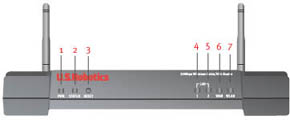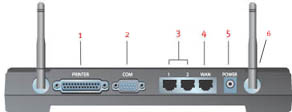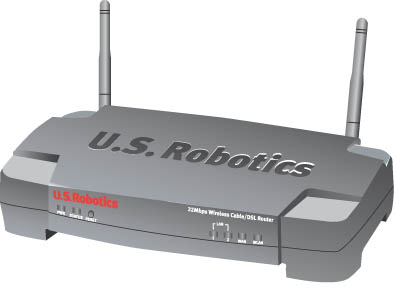
Contents:
Introduction
Configuring the 22 Mbps Wireless Cable/DSL Router
22 Mbps Wireless Cable/DSL Router User Guide (Windows 95, 98, 2000, NT, Me, XP, and Macintosh)
Introduction
Functions and Features
- Broadband Internet sharing
- 2 auto-sensing 10/100 Mbps LAN Ethernet ports
- VPN support: PPTP/IPSec pass-through
- Printer sharing
- Firewall (using Network Address Translation technology)
- DHCP server
- Web-based configuration utilities
- Access Control
- Virtual Server (User-Definable Port Forwarding)
- User-Definable Application Sensing Tunnel
- DMZ Host
- USRobotics Wireless Access 802.11b DSSS compatible, with high data 22/11/5.5/2 /1 Mbps
- 64-bit, 128-bit, or 256-bit (optional) key WEP (Wired Equivalent Privacy) wireless data encryption for security
- Full support for 802.11b Open and Shared key Authentication
- AP Management through standard Web browsers
- Roaming capability
- Seamless connectivity to wired Ethernet 802.3 10Base-T and PC network LANs augments existing networks quickly and easily
- Dynamic IP Address assignment via DHCP or Static IP Address assignment by the custom utility
- AP firmware upgrades available through FTP transfers
What You Need to Begin
- PC with an Ethernet Network Interface Card (NIC) installed or an 802.11b wireless adapter installed
- A functioning Ethernet-based cable or DSL modem OR an RS-232 based analogue or ISDN modem
- Operating system installation CD-ROM (i.e., your Windows XP CD-ROM)
- Internet Explorer 4 or later OR Netscape 4 or later
- An RS-232 serial cable if you have an analogue or ISDN modem
- 802.11b compatible wireless PC card, PCI adapter, and/or USB adapter installed and configured (for 22 Mbps speed and for 256 bit WEP security, use 22 Mbps wireless cards or adapters)

Front View
- Power LED: The green Power LED stays lighted to indicate the system is functioning properly.
- Status LED: This LED blinks green to indicate active status, blinks yellow during a reset and a firmware upgrade, and lights yellow during a reboot.
- RESET Button: Press in and hold the RESET button. While holding the RESET button, unplug then plug back in the power supply. When the 22 Mbps Wireless Cable/DSL Router has power again, continue to hold the RESET button for about five seconds to reset the 22 Mbps Wireless Cable/DSL Router to the factory default settings.
- LAN1 LED: This LED is lighted and green when a 100 Mbps connection is established to LAN port 1 or blinking and green when LAN port 1 is sending and receiving data. This LED is lighted and yellow when a 10 Mbps connection is established to LAN port 1 or blinking and yellow when LAN port 1 is sending and receiving data.
- LAN2 LED: This LED is lighted and green when a 100 Mbps connection is established to LAN port 2 or blinking and green when LAN port 2 is sending and receiving data. This LED is lighted and yellow when a 10 Mbps connection is established to LAN port 2 or blinking and yellow when LAN port 2 is sending and receiving data.
- WAN LED: The green WAN port LED is lighted when a connection is established and flashes when the WAN port is sending or receiving data.
- WLAN LED: This LED is lighted and green when there is a connection to the wireless network or blinking and green when the wireless clients are sending or receiving data.

Back View
- PRINTER: This parallel port is used to attach a printer to the local area network (LAN).
- COM: This serial port can be used to connect an analogue or ISDN modem.
- LAN Ports 1 and 2: The LAN ports are used to connect Ethernet devices to the LAN.
- WAN: The RJ-45 WAN port is used to connect the 22 Mbps Wireless Cable/DSL Router to a broadband modem.
- 5VDC: This connection port is for the power supply of the 22 Mbps Wireless Cable/DSL Router.
- Antennae Ports: These connection ports are reverse polarity, SMA male connectors.
Note: The USRobotics 22 Mbps Wireless Cable/DSL Router can easily be connected to any Ethernet-based cable modem or DSL modem, or an RS-232 based analogue or ISDN modem. You can verify compatibility by checking to see if your cable or DSL modem is connected to the network adapter in your computer using an Ethernet cable. The 22 Mbps Wireless Cable/DSL Router cannot be connected to a cable, DSL, analogue, or ISDN modem that only uses a USB connection.
There are five types of WAN network connections that are supported by the 22 Mbps Wireless Cable/DSL Router: Static IP Address, Dynamic IP Address, Dynamic IP Address with Road Runner Session Management, PPP over Ethernet, PPTP, or Dial-up Network. If you have a Static IP, Dynamic IP Address, IP Address with Road Runner Session Management, PPP over Ethernet, or PPTP connection, refer to Appendix A in the Appendixes section. If you have a dial-up connection, refer to Appendix B in the Appendixes section. If you are unsure about the specifics of your network connection, contact your Internet Service Provider (ISP).

